Key takeaways:
- Clear cancellation policies provide peace of mind for both diners and restaurants, fostering trust and loyalty.
- Flexible and empathetic responses to cancellations can enhance customer relationships and encourage repeat visits.
- Understanding the cancellation terms ahead of time helps diners manage expectations and feel more confident in their choices.
- Open communication about cancellations often leads to positive outcomes and reflects well on the restaurant’s hospitality.
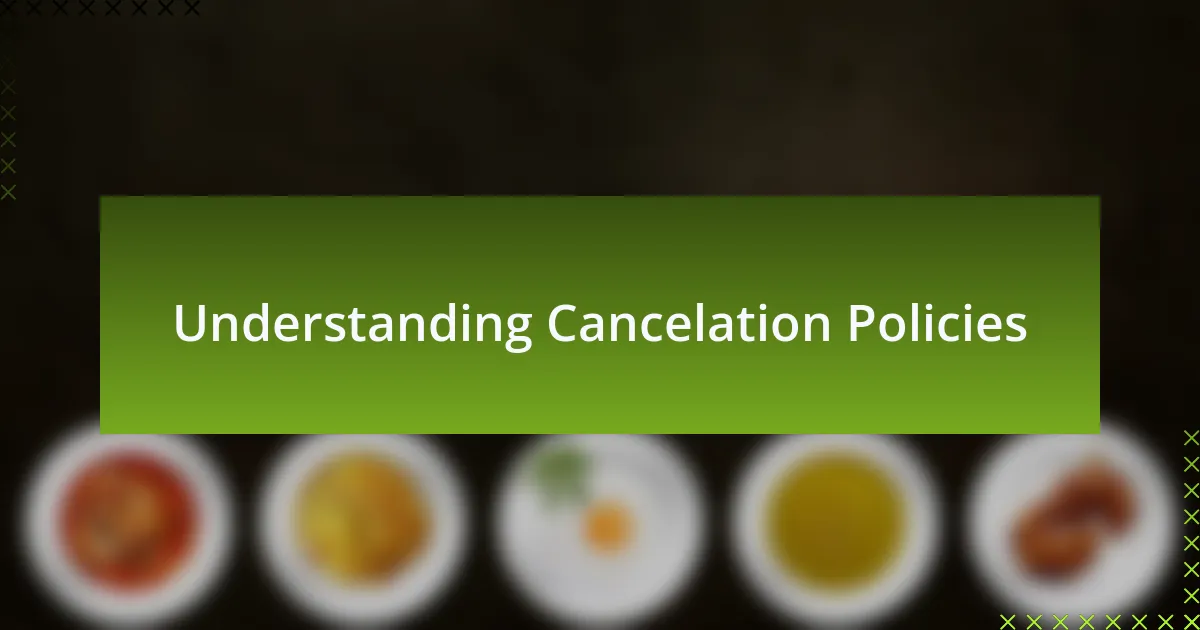
Understanding Cancelation Policies
Understanding cancellation policies in fine dining can sometimes feel overwhelming, yet they play a crucial role in the restaurant’s operations. I remember a time when I had a last-minute change in plans and scrambled to check the restaurant’s policy. Discovering a strict 48-hour notice requirement added a layer of stress I hadn’t anticipated—did I want to lose my deposit just because life threw me a curveball?
The nuances of these policies vary widely and can often include stipulations for both refunds and rescheduling. For instance, there was a lovely restaurant I adored that allowed one change in reservation time, but beyond that, you faced a hefty fee. It made me wonder how often people actually read these rules before booking—after all, wouldn’t it ease a lot of future headaches if we were all just a bit more informed?
I have also encountered situations where restaurants were surprisingly accommodating. Once, a fine dining venue waived my cancellation fee after an unexpected family emergency. It left me feeling an emotional connection to that place, as they understood the importance of empathy alongside their business. Isn’t it interesting how a little flexibility can make you not just a customer, but a loyal patron?
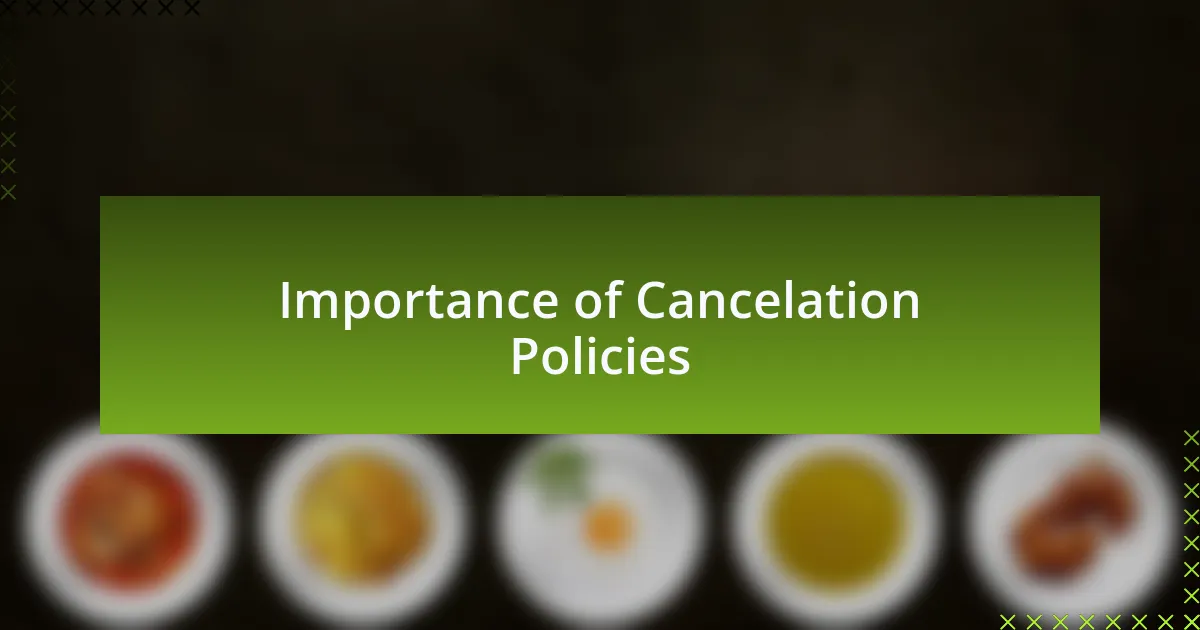
Importance of Cancelation Policies
When I think about cancellation policies, the first thing that comes to mind is the safety net they provide for both guests and restaurants. I recall a time when I booked a special evening for an anniversary, yet an unexpected work obligation cropped up. Knowing that the cancellation policy allowed for a full refund with a day’s notice gave me peace of mind, which is essential for any dining experience meant to be memorable.
On the flip side, I’ve experienced the frustration of rigid policies firsthand. There was one upscale restaurant that inflexibly held onto my deposit when I couldn’t make it, leaving me feeling more disappointed than ever. It made me realize that while policies are necessary for business, they can also serve to alienate potential repeat customers. Isn’t it remarkable how a little understanding can cultivate loyalty?
Ultimately, cancellation policies serve as the backbone of the restaurant’s financial stability, but they also hold undeniable emotional weight. If a restaurant prioritizes clear and empathetic guidelines, I believe it can transform a simple dining experience into something truly special. Have you ever felt a stronger connection to a place simply because they understood your situation? That’s the kind of rapport that goes beyond dining; it’s about building a community.
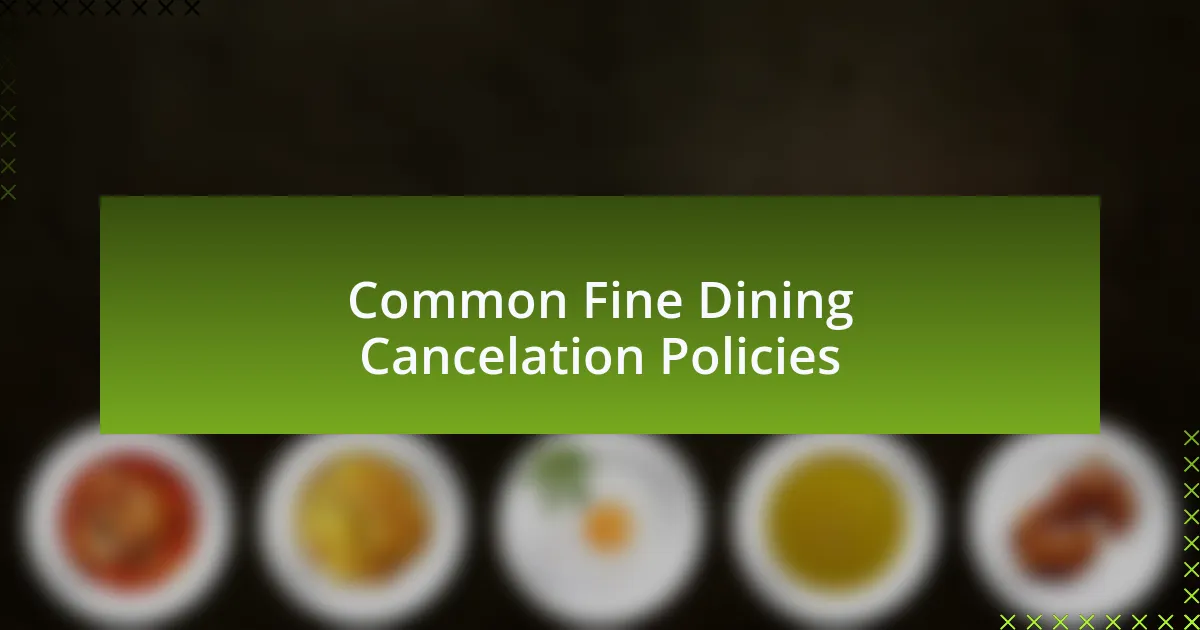
Common Fine Dining Cancelation Policies
In my experience, many fine dining restaurants implement a 24 to 48-hour cancellation policy. This window allows them to manage reservations effectively while also providing guests enough time to adjust their plans. I remember once having to cancel a highly anticipated evening, and the restaurant was understanding, allowing me to reschedule without losing my deposit. It reinforced how a fair policy can enhance the overall dining relationship.
Some establishments take a more stringent approach, requiring a credit card guarantee upfront. While this might seem intimidating, I’ve found it offers a layer of commitment that can sometimes lead to better service. When I went to a renowned restaurant with this policy, I noticed that the staff was exceptionally attentive, perhaps feeling they had an invested audience. Isn’t it interesting how the dynamics shift when both parties have something at stake?
Then there are those places that charge a fee for last-minute cancellations or no-shows. Although I’ve always understood the rationale behind this, I find myself wondering if it discourages last-minute diners. A recent experience left me contemplating this as I was hesitant to book last minute, worried about fees. I believe finding a balance between protecting the restaurant’s interests and keeping guests comfortable is crucial to fostering lasting relationships in the fine dining scene.
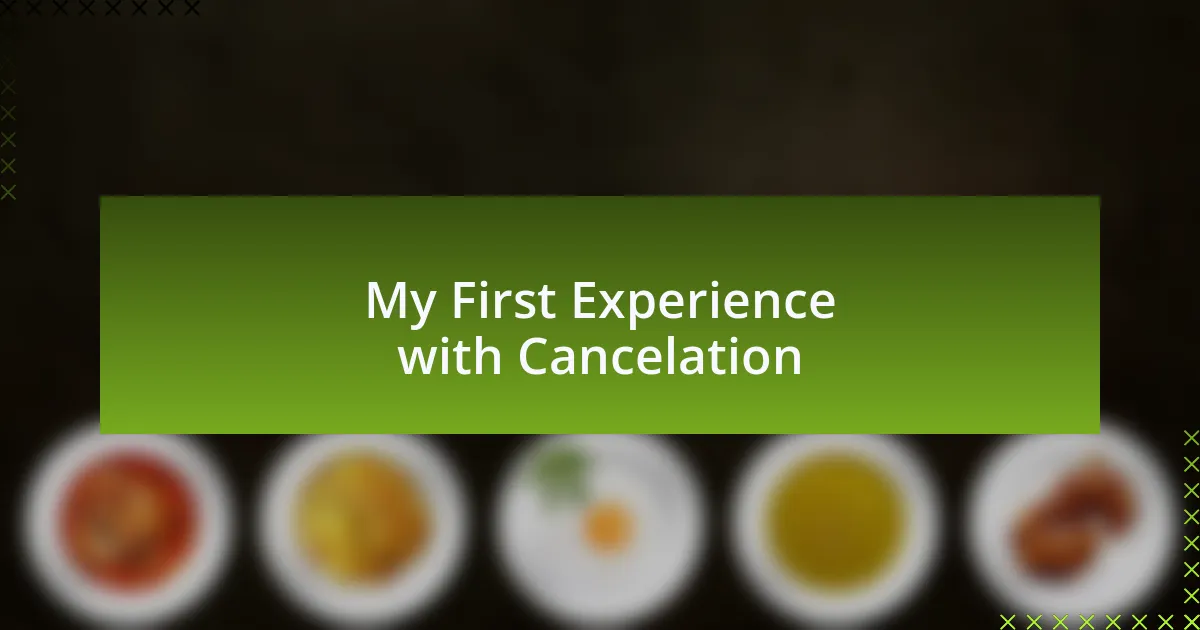
My First Experience with Cancelation
I vividly recall the first time I had to cancel a reservation at a fine dining restaurant. It was a special occasion, and I had been looking forward to it for weeks. When the time came to pick up the phone, I felt a tug of disappointment, but I was relieved to find that the staff was remarkably understanding and helpful in rescheduling.
That initial experience taught me the importance of clear cancellation policies. I remember feeling anxious about potentially losing my deposit. However, the restaurant’s willingness to accommodate my situation made me realize that such policies can also create a sense of trust. Isn’t it reassuring when a restaurant prioritizes customer experience alongside its operational needs?
I think back to that moment and realize it set the tone for how I approach fine dining reservations now. I’m much more willing to explore new places, knowing that many establishments understand that life’s unpredictability can lead to last-minute changes. How comforting is it to know that a fine dining experience can still be enjoyable, even when plans go awry?
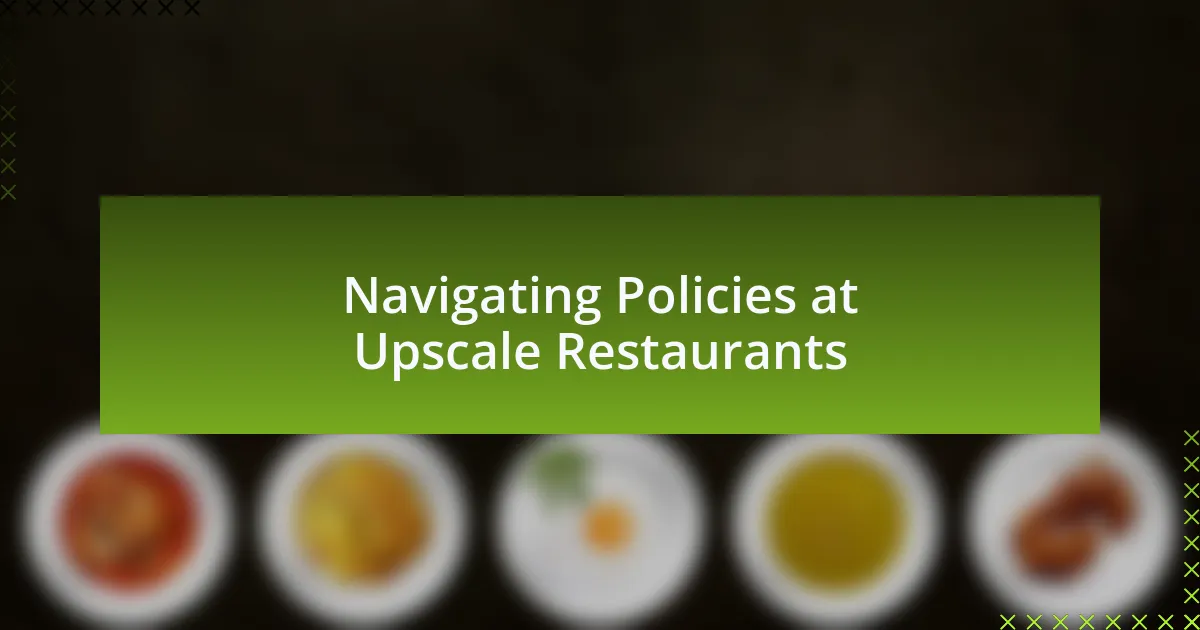
Navigating Policies at Upscale Restaurants
Navigating cancellation policies at upscale restaurants can feel a bit daunting. I recall my attempt to book a weekend dinner at a highly recommended establishment only to discover their 48-hour cancellation policy. It made me hesitant to finalize my plans, but, ultimately, understanding these policies allowed me to manage my expectations and alleviate some of that anxiety.
On another occasion, I faced a situation where I needed to cancel less than a day in advance. I felt a knot in my stomach, worrying about the repercussions. To my surprise, the staff was incredibly gracious, waiving any fees and encouraging me to return in the future. Experiences like this reinforce how important empathy is in the restaurant industry. Don’t you think it’s a sign of a truly upscale establishment when they handle such matters with grace?
Arming myself with knowledge about a restaurant’s policies has become essential in my dining adventures. I often check their website or call ahead to clarify the terms. Taking these steps not only enhances my dining confidence but also fosters a sense of appreciation for the establishments that prioritize communication and customer satisfaction. Wouldn’t you agree that knowing where you stand can turn a potentially stressful situation into a delightful experience?

Tips for Dealing with Cancelations
When dealing with cancellations, I’ve learned that honesty is the best policy. Early in my dining experiences, I hesitated to share my reasons for canceling, fearing negative repercussions. However, I discovered that being open often results in understanding from the restaurant staff. It’s worth considering how much easier it is when you communicate rather than allowing assumptions to fester, don’t you think?
I’ve also found that flexibility can work wonders. On one memorable night, I opted for a different dining time rather than completely giving up on an experience. The restaurant was accommodating, allowing me to shift my reservation without any hassle. This taught me that sometimes, being adaptable leads to unexpected and delightful dining adventures. Isn’t it refreshing when things go smoothly after a potential hiccup?
Finally, I suggest keeping a mental record of your experiences with various cancellation policies. By noting which establishments are more lenient and those that are strict, I’ve been able to tailor my future plans accordingly. This practice not only reduces the anxiety of booking but also fosters loyalty to those restaurants that treat their customers well. Have you ever considered how understanding cancellation policies can enhance your overall dining experience?

Lessons Learned from My Experience
Throughout my experiences, I’ve learned that having a clear understanding of a restaurant’s cancellation policy can truly ease the stress of planning. For instance, I once faced a last-minute change of plans and was pleasantly surprised to find that a local fine dining restaurant had a very reasonable policy. Their transparent approach saved me from any guilt or worry, illustrating how such clarity fosters a better relationship between diners and dining establishments. Have you ever felt the weight lift when you realized your favorite restaurant was accommodating?
I’ve also become a firm believer in the importance of timing. I remember a situation where I called well ahead of my reservation to cancel, and instead of facing backlash, the staff expressed gratitude for the early notice. This taught me that showing consideration often pays off — it’s a simple gesture that can open the door to future dining opportunities. Isn’t it interesting how courteous communication can transform a potentially negative situation into a positive one?
Lastly, I’ve realized that every cancellation experience contributes to my greater understanding of hospitality. The most memorable lessons often arise from less-than-ideal circumstances. For example, waiting for a response to a cancellation request once made me anxious, but it ultimately taught me patience and the value of understanding from both sides. When you view cancellations as a two-way street, it can lead to more respectful interactions. Have you noticed how these lessons often shape your dining decisions later on?